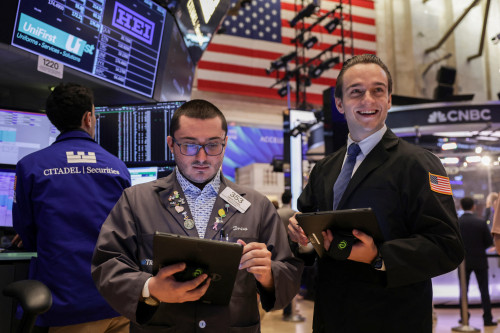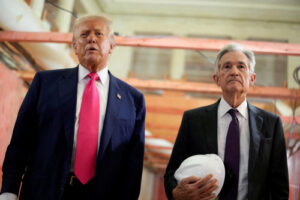By Saqib Iqbal Ahmed
NEW YORK (Reuters) -With more than half of second quarter earnings reported and stocks near record highs, company results have reassured investors about the artificial intelligence trade that has energized Wall Street, even if tariff worries curtailed buying.
With results in from 297 of the S&P 500 companies as of Thursday, year-on-year earnings growth for the second quarter is now estimated at 9.8%, up from 5.8% estimated growth on July 1, according to LSEG data.
Next week investors will get a peek at earnings from Dow Jones Industrial Average constituents Disney, McDonald’s and Caterpillar, for a look at the broader economy. Strong profit reports for these companies could propel the Dow, trading just shy of its December record high, to a fresh peak.
Some 81% of the companies have beaten analyst expectations on earnings, above the 76% average for the past four quarters.
“The earnings season has been unambiguously better than expected,” Art Hogan, chief market strategist at B. Riley Wealth in Boston, said.
The strength of corporate earnings is particularly reassuring for investors after the pummeling sentiment took in the prior quarter due to the twin threats of tariffs and worries over flagging economic growth.
“The first quarter was a bit more mixed and you had some questionable economic data … which I think gave the market some pause,” said Tim Ghriskey, senior portfolio strategist at Ingalls & Snyder in New York.
“But the second quarter seems to have just been a turnaround,” Ghriskey said.
The strength of results for names linked to the artificial intelligence trade – the investment thesis that AI will be a transformative force, driving a significant portion of future economic growth and company profits – is particularly heartening, investors and analysts said.
“Overall it has been mega caps, growth/technology/AI that is driving a lot of the results,” Ghriskey said.
“This is where we want to be exposed in terms of companies … we’re at maximum equity exposures and we’re comfortable there.”
Having boosted the market for several quarters, the trade ran into rough waters at the start of the year as the emergence of Chinese-founded artificial intelligence startup DeepSeek rattled investors, stoking concerns over heightened competition that could disrupt the dominance of established tech giants at the heart of the AI trade, including Nvidia.
Strong results from Microsoft and Meta Platforms reassured investors that massive bets on AI are paying off.
Worries over AI demand appear overblown, Macro Hive research analyst Viresh Kanabar said.
The trade related tumult earlier this year prompted many investors to pare equity exposure, particularly to higher-risk growth stocks.
Even after the market rebound – the S&P 500 is up about 6% for the year and near a record high – institutional investors have been slow to return to equities. Overall, investors’ equity positioning is still only modestly overweight, according to Deutsche Bank estimates.
Strength in earnings from AI and technology names could draw more investors and lift markets further in coming weeks, analysts said.
“If you are trying to beat your benchmark and you were underweight any of the AI names you have to chase them,” B. Riley Wealth’s Hogan said.
After S&P 500’s 2.2% gain in July, the seasonally volatile months of August and September, markets might face some short-term turbulence, Hogan said. Historically, August has marked a pick-up in stock market gyrations that peaks in October.
August kicked off with stocks selling off sharply on Friday as new U.S. tariffs on dozens of trading partners and Amazon’s unimpressive earnings weighed on sentiment, while a weaker payrolls report added to risk aversion.
But any near-term market pullback should be seen as a buying opportunity, especially in some of the mega-cap, technology names, Hogan said.
With big AI names, Alphabet, Microsoft, Nvidia, Meta Platforms and Amazon, commanding about a quarter of the weight in the S&P 500, the health of the AI trade bodes well for the market at an index level, analysts said.
“We’re not saying the weakness isn’t there in other parts of the economy,” Kanabar said.
“We’re just saying at the index level, the largest companies dominate to such an extent (that) it doesn’t matter to some at the moment.”
(Reporting by Saqib Iqbal Ahmed; Additional reporting by Caroline Valetkevitch and Chuck Mikolajczak; Editing by Alden Bentley)




